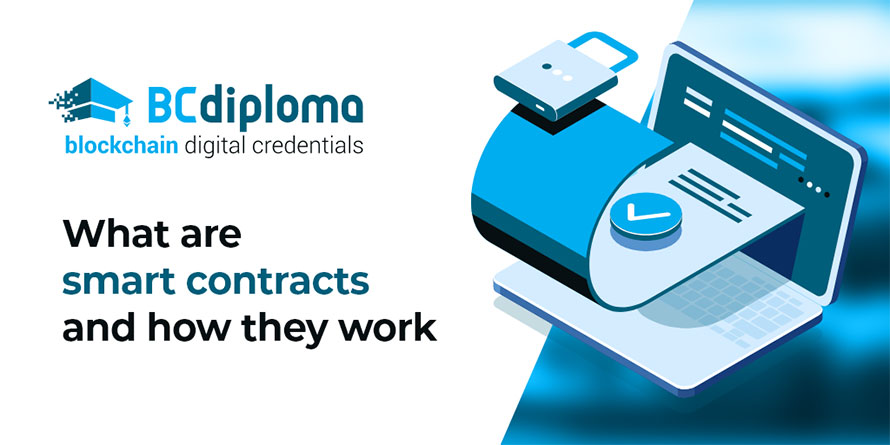Smart contracts originated in the 1990s in the United States. Invented by Nick Szabo, a cryptographer, world-renowned for his work on the concept of the blockchain, smart contracts are the fruit of a convergence between IT, law and human relations. In short, a smart contract represents an agreement between two parties expressed in computer code. By applying a precise protocol, a smart contract reproduces contractual conditions within the context of a digital framework.
The year 2009 marked a turning point in the development of smart contracts with the rise of cryptocurrencies, in particular Bitcoin. It quickly became clear that the addition of well-defined exchange conditions was necessary for the proper functioning of virtual transactions.
Over the following years, smart contracts were extended to other areas of interest, by broadening their conditions of use and the scope of their applications. Get the low-down on smart contracts with BCdiploma, and find out how they are related to blockchain technology.
What is a smart contract?
Definition of a smart contract: What is a contract?
A contract is an agreement that commits one or more parties to giving, doing or not doing something, in relation to one or more other parties. Framing this commitment are the conditions of the contract, which formalize terms and obligations and guarantee their application.
Smart contracts, contracts formulated in IT terms

Smart contracts respond to the exact same principle as ordinary legal contracts. A smart contract is produced by a certain computer program that leverages blockchain technology to ensure its integrity. The smart contract then acts as a protocol, or computer code, that applies the clauses of the contract automatically, without requiring an intermediary to interpret them.
A smart contract therefore materializes the agreement between parties in computer code and self-executes it. The technology is based on a Decentralized Autonomous Organization (DAO) system, which is used to automate and therefore simplify all the processes that usually involve various stakeholders. The obligations of a smart contract therefore apply thanks to code, unlike a contract in a paper version, whose clauses are governed by law.
The application of a smart contract is based on instructions entered into the code of the blockchain that hosts the smart contract. When the established conditions are met (the “if/when/then”), the network of computers associated with the system execute the actions of the contract. Following the execution of the actions on the blockchain itself, the contract is then updated automatically, authenticating its successful conclusion.
The finalized transaction is not modifiable in any way, but can, however, be viewed and verified by all the parties concerned. To make the execution of a step within a smart contract or series of smart contracts, the previous step must have been fulfilled in all of its conditions. This step-by-step validation of smart contracts represents a guarantee of their security and application. Human error is therefore reduced to an absolute minimum, and further extraneous interpretations and negotiations are impossible.
For their smooth operation, smart contracts should be carefully audited by all the parties concerned, to establish rules for their use, conditions for their validation, and the exact computer code used in the contract. This will ensure the swift and simple resolution of any problems that might arise in their application. Traditionally, smart contracts have been coded by developers, but with the popularization of the blockchain in various fields, more and more web interfaces and online tools have emerged to assist in setting them up.
The applications of smart contracts

Though smart contracts were originally created to support and govern the exchange of cryptocurrencies such as Bitcoin, smart contracts now have a wide range of applications in varied areas such as financial contracts, commercial agreements, and the gaming world. This means that the developers creating the systems for running and operating smart contracts have to have in-depth knowledge of the sector concerned, in order to be able to establish the right requirements for their application. In the business world, for example, smart contracts are particularly useful for the exchange and transfer of money and goods, by optimizing transactions and shortening validation times.
Smart contract applications, driven by the fast-evolving technology of the Ethereum blockchain, to name one of most well-known, are spreading to all kinds of sectors, including:
- Real estate
- Health
- Media
- Energy
- Finance
- Government
- Education
The smart contract economy certainly has a bright future ahead, and cryptocurrencies will be continue to be major players in this digital sphere.
What exactly can smart contracts be used for?
Deployed in right way, smart contracts offer many benefits for their users and co-signees. On the other hand, they also have some limitations that one should be aware of.
Benefits of smart contracts
There are many benefits to using smart contracts:
- The impossibility of circumventing the system, thanks to the pre-acceptance of the established conditions programmed into the smart contract.
- Harmonization of contract terms and conditions, such as confidentiality or payment terms.
- Minimization of human errors, and attempts of fraud or embezzlement.
- Considerable time savings by eliminating the need for intermediaries and figures of authority, such as notaries, lawyers, judges, etc., which are often needed in the case of traditional paper contracts.
- Increased security, guaranteed by recording the smart contract on a blockchain.
- Reduced risk of payment defaults.
- Reduced costs for creating, monitoring and enforcing the contract.
Transactions made on the blockchain, as part of the execution of a smart contract, are authenticated and secured using an encryption algorithm, making them totally tamper-proof. Similarly, since each “block” containing the transactions are “chained” to the previous block, hacking the data of a block is practically impossible.
Disadvantages and limitations of smart contracts
By definition, all kinds of contract have their limitations, and smart contracts are no exception to the rule. In the IT field, any system, even when perfectly set-up and secured, has its risks of failing under certain circumstances, most of all due to human error. The democratization of smart contracts has certainly attracted the attention of hackers looking for loopholes in the system, in particular, by using social engineering techniques. However, developments in the maturity of blockchain technology, of the coding languages used in smart contracts, of developer skills in using such languages, of the formalization of tests and of the reuse of audited code already make it possible to mitigate such risks.
Smart contracts are inseparable from blockchain technology
The role of blockchain technology in the execution of a smart contract
Smart contracts are executed on blockchain technology using computer code that is deployed across a shared network of authorized users. In this sense, it is the blockchain that offers guarantees of authentication and traceability for the execution of smart contracts aimed at the application of the clauses of a legal act or agreement. The blockchain therefore allows smart contracts to tap into the benefits of a decentralized system in order to strengthen safeguards and applications in a specific domain.

BCdiploma and smart contracts
The number of applications of certification by way of blockchain technology is rapidly expanding across sectors, including banking and education. And while smart contracts have their origins in the field of finance and cryptocurrencies, they are extremely useful for storing digital credentials, including diplomas and certificates of formal documents, qualifications and transversal skills, such as in the form of micro credentials, with blockchain technology guaranteeing the security and integrity of all the data concerned. BCdiploma thus offers a reliable blockchain storage solution that allows for easy verification of the authenticity of all the documents stored in this way. Security is at the heart of BCdiploma’s concerns, and, in this regard, it makes use of a special encryption algorithm and a unique and inviolable key, which are, in turn, certified by smart contracts to guarantee the absolute reliability of the data and its ability to be easily consulted and verified.
